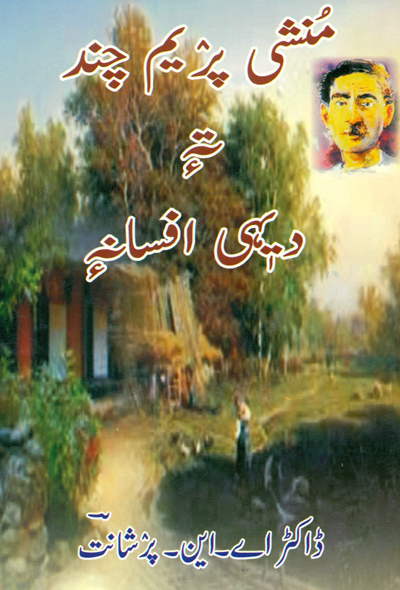J L Raina
Author: Dr. A.N. Prashant
Language: Prashant Publications,
Rehari, Jammu
Price: Rs. 500/-
The world of literature is a distant domain, with its own characteristics and eccentricities. Here is a writer, who has been teaching official language (Hindi) of Government of India in the ministry of Home Affairs in various states of the country, now comes out with a book in Kashmiri, written on famous writer Prem Chand (1880-1936) analyzing his short stories, that mostly reflect village life. Dr. Prashant has to his credit two more books of research & criticism, one on the life and works of famous kashmiri poet, Abdul Ahad “Azad” and the other a comparative and critical study of “Azad” and Dr. Ramdhari Singh “Dinkar”, a renowned nationalist and revolutionary poet of Hindi. These books are in Urdu and Hindi respectively. The books won him many accolades. Prem Chand, who has often been called the ‘Dickens of India’ Lived and wrote during the early years of freedom movement. Prem Chand who has more than 15 novels and more than 300 short stories to his credit, wrote in urdu in early years and later shifted to Hindi, was influenced by some contemporary urdu writers, impressed by Russian revolution, an ardent supporter of freedom movement and a fan of Gandhi. Much has been written on Prem Chand’s life and it would not serve any purpose to repeat it here. The objective of this review is to bring out the workmanship/craftsmanship, analytical mind, sharp perception and creative thinking of the author. Dr. Prashant has done much hard work and has deliberately chosen only one part of Prem Chand’s creative work i.e, Short Stories, which of course reflected the tough and struggling life of village people, their problems, difficulties faced, disadvantages suffered due to the tyranny of rulers, administrators and their exploitation by people in the higher echelons of life, the landlord, money-lender etc. Dr. Prashant presents us with Prem Chand’s feelings, views beliefs and approach towards different aspects of life, and the character traits of different sections of people in the society, the general way of life in the village, bringing out both the good as well as the evil, the people’s superstitions and bad customs and behavior patterns of typical professional people with whom villagers had to deal with.
Like a psychologist, Dr. Prashant has delved into the different aspects of Prem chand’s life, with his struggles predicament and disappointment, views and beliefs that had an impact on his writing.
The different stages of Prem Chand’s evolution as a writer have been juxtaposed with the different events in the country and the world. He had been much impressed by Russian revolution but he was an ardent supporter of Mahatma Gandhi and his non-cooperation movement. If he was an idealist in thought, he was a realist, when it came to his literature. In matters of religion, you could call him (Prem Chand) an agnostic, if not an atheist. Religious distinctions or differences of caste were immaterial for him. He was a champion of the cause of the downtrodden, the economically backward, the labour class, the landless tiller, who had to confront with want and economic hardship, though they worked all the year around. Prem Chand’s short stories depict the various aspects of the life of these people very clearly. His voice was a protest against the tyranny of village official like patwari, landlord, money-lender and even the people placed in better situation, who did not treat these people properly. Dr. Prashant has analysed the short stories very deeply and achieved an objective, which had three dimensions. Firstly, he elaborated the Prem Chand’s highlight on torture and injustice meted out to these hard working people. Yet these people suffer for no fault of theirs, the only reasons being of having been placed at a lower stage in the hierarchy of society. Not only officialdom – like revenue officials etc, but also the money – lender, the landlord, the religious priest, and the trader targeted them. Secondly, Prem Chand does not spare the people for being blind followers of custom, suffering from superstitions, and their unwise behavior of getting trapped into debt, not only for meeting their necessities but also to keep up their ‘prestige’ and follow customs that are bad, and spend lavishly on religious functions and marriages. In this context, Prem Chand has played the role of a social reformer. But the third dimension is how Prem Chand has shown these people to be simple in their beliefs, innocent, and prepared to do anything for their brethren, when in trouble.
What is outstanding about these people is that inspite of belonging to different religious, castes or sects; there is a kind of brotherhood and harmony among them. That is how people belonging to different religions lived together peacefully and were always ready to help one another. The period may have been one hundred years ago, yet there was no intolerance among them. Last, but not the least, Prem Chand was a supporter of women’s empowerment and support for their dignity. He has not forgotten to uphold the case of Harijans.
It is a critical work, useful for the students of literature, especially of Kashmiri Literature.
Trending Now
E-Paper


